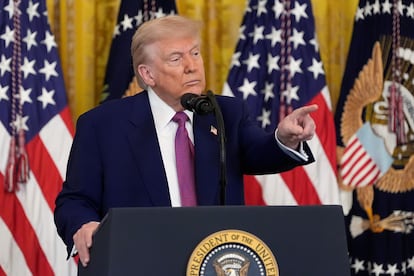US targets networks of corrupt politicians who aid drug cartels
The Trump administration includes among its criminal targets foreign officials who have received bribes from drug trafficking and organized crime money-laundering networks

The Donald Trump administration will direct its criminal prosecution apparatus toward networks of corrupt foreign officials who collaborate with drug cartels. It will also focus on dismantling the networks of front companies used by drug traffickers to launder illicit proceeds. This is the next step in Trump’s toughened strategy against organized crime groups, after having designated eight cartels — six of them Mexican — as terrorist organizations. This new policy against white-collar crime, while not specifically directed at Mexico, implies that in the future, Washington will not only pursue drug lords but will also begin to demand that its southern neighbor, or any other country, take more decisive action against corrupt public officials.
The new strategy was announced this week by the office of U.S. Assistant Attorney General Todd Blanche. In a memo, the official outlined the new guidelines for enforcing the Foreign Corrupt Practices Act (FCPA), which had been temporarily suspended with the start of the Trump administration. The document, sent on June 9 to Matthew R. Galeotti, head of the Justice Department’s Criminal Division, establishes a list of conditions that an alleged crime must meet for a criminal investigation to be initiated under the law. Regarding drug cartels, Blanche’s directive states that “investigations related to foreign bribery that facilitates the operations of cartels and transnational criminal organizations should be prioritized.”
The memorandum argues that the dominance of cartels and other international crime organizations produces instability and violence, and “erodes the rule of law and economic growth.” Therefore, it indicates, seeking to eradicate these criminal groups “will require a sustained effort to pursue their corrupt partners and dismantle the financial mechanisms and front companies used by these criminal networks.” Blanche states that, to undertake an investigation under the FCPA, one of three conditions must be met: the alleged crime must be linked to the criminal operations of a cartel or transnational organization; the use of front companies connected to the laundering of cartel funds; or the involvement of employees of state entities or other foreign officials who have received bribes from the cartels.
In February, Trump declared the Sinaloa Cartel, the Jalisco New Generation Cartel (CJNG), La Familia Michoacana, Cárteles Unidos, Cartel del Noroeste, and the Gulf Cartel as terrorist organizations. One of the consequences of this declaration was to strengthen Washington’s tools to target the financial networks that support the criminals’ daily operations. It also expanded Washington’s authority to use direct force, sparking controversy over how far the United States could violate Mexico’s sovereignty in order to enforce Trump’s strategy against the cartels.
Legal expert Estefanía Medina, director of the litigation organization Tojil, explains that Deputy Attorney General Blanche’s memorandum is a guide to the global application of the FCPA, but that it will have specific effects for Mexico in cases related to the public, corporate, and financial sectors. “Of course, if matters involving cartels that fall under these headings are going to be the number one priority, and there are six Mexican cartels designated as terrorist organizations, it’s obvious that, for practical reasons, some cases will be related to Mexico. But it’s more of a practical matter; it doesn’t seem to me to be a deliberate message to Mexico,” Medina explains in an interview from Washington.
Trump’s strengthened policy against white-collar crime not only focuses on combating drug trafficking support networks: companies and officials who disrupt free competition and undermine investment opportunities for U.S. firms will also be prosecuted. Considering that expanding business abroad and pursuing economic prosperity is a matter of national security, the U.S. will act against “corrupt competitors” who bribe public officials to obtain illicit contracts and benefits, thus putting American corporations at a disadvantage, according to Blanche’s memo.
News of Washington’s alleged interest in taking action against Mexican narcopolitics has been circulating for several months, with no official confirmation. This week, Reuters reported that the Trump administration has specifically asked officials of Mexican President Claudia Sheinbaum’s government to investigate politicians with possible ties to drug trafficking and extradite them to the U.S. if necessary. In these conversations, according to the British news agency, Mexican counterparts have been urged to take action, even against politicians from Morena, the ruling party.
The Sheinbaum administration has denied that the United States has made such requests. A few weeks ago, ProPublica also reported that Washington was preparing a list of names of “several dozen” politicians who would be subject to travel restrictions for their links to “corruption stemming from drug trafficking.” Beyond the U.S. targeting specific individuals, Trump has stated that drug cartels dominate large areas of Mexican territory and that the Sheinbaum administration is “afraid” to take action against them.
Sign up for our weekly newsletter to get more English-language news coverage from EL PAÍS USA Edition
Tu suscripción se está usando en otro dispositivo
¿Quieres añadir otro usuario a tu suscripción?
Si continúas leyendo en este dispositivo, no se podrá leer en el otro.
FlechaTu suscripción se está usando en otro dispositivo y solo puedes acceder a EL PAÍS desde un dispositivo a la vez.
Si quieres compartir tu cuenta, cambia tu suscripción a la modalidad Premium, así podrás añadir otro usuario. Cada uno accederá con su propia cuenta de email, lo que os permitirá personalizar vuestra experiencia en EL PAÍS.
¿Tienes una suscripción de empresa? Accede aquí para contratar más cuentas.
En el caso de no saber quién está usando tu cuenta, te recomendamos cambiar tu contraseña aquí.
Si decides continuar compartiendo tu cuenta, este mensaje se mostrará en tu dispositivo y en el de la otra persona que está usando tu cuenta de forma indefinida, afectando a tu experiencia de lectura. Puedes consultar aquí los términos y condiciones de la suscripción digital.









































